Marisa is a member of a the Lawa tribe, a minority group with its own distinct dialect and tradition found only in certain isolated areas in northern Thailand. She lives in Laoop, a village located in a very high, remote area.
Even though Marisa finished grade nine, the quality of education she received at the school in her village was poor compared to the education she could have received at a school in the city.
As a member of a minority tribal group, Marisa’s options after school were limited. Most villagers in Laoop are educated only until grade six or nine, and after their brief education they usually find jobs and begin working. Marisa chose to work for a brief period, and when she turned 18 she married one of her neighbors and began her role as a housewife and a mother.
“Being pregnant made no difference to my work schedule. I still worked in the fields because I believed that it would strengthen my unborn child. I also ate the exact same meals I had before I was pregnant. My meals consisted of rice and boiled vegetable with spicy sauce. I did not eat anything special.
“After I got home from the hospital, I went to a health center nearby my village to attain information on how to raise my baby to be healthy and how to increase his weight. At the health center the nurse assistant briefly informed me on some basic guidelines, but she explained the information too quickly and I only understood a little of what she said.”
Marisa could not ask for advice or attend a class taught by a nurse at a hospital in the town because her village was far away. She didn’t have regular access to transportation that could take her to a nearby town, but occasionally paid her neighbors to take her down to the lowlands to the nearest town. A ride cost her approximately $3. (The family only earns about $60 per month.)
With very limited resources and budget, Marisa raised her first child, Nattanon, within her financial means and according to her own understanding and tribal traditions. Marisa breast-fed her baby son until he was 4 months old, at which time she went back to work in the fields. She left Nattanon with her mother-in-law, who only fed him boiled rice.
At the age of 8 months Nattanon was still underweight and his health had not improved. As an inexperienced mother, Marisa felt helpless and very frustrated. She likened her experience to feeling as though she was in a dark, stormy ocean about to drown. She felt alone with no one able to help her and rescue her from the huge and threatening wave of worry over her son’s fragile state of health.
Fortunately, the director of Akape Child Development Center knew of the problem that many of the young mothers in his hometown faced. When the Child Survival Program (CSP) opened at his church, Marisa was one of the first mothers selected for the program.
“I wanted to see mothers have access to the knowledge they needed on how to raise their children in a healthy manner, and I wanted to improve the quality of these children’s lives. Most importantly, I wanted to introduce my village to the One who nourishes, strengthens and gives eternal life to one’s spirit. I wanted my fellow villagers to know about Christ.”
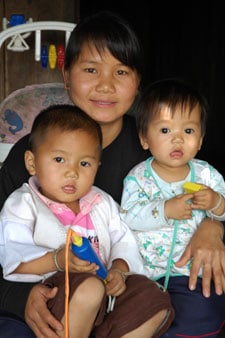 The very first thing Marisa received from the program was powdered milk, eggs, canned fish and supplementary food for her child. The staff also taught her how to supplement her child’s meals in order to help him gain weight.
The very first thing Marisa received from the program was powdered milk, eggs, canned fish and supplementary food for her child. The staff also taught her how to supplement her child’s meals in order to help him gain weight.
Since Marisa registered with the program, she hardly ever misses the classes. Her enthusiasm and gratitude are evident every time she goes to the church. She attends classes every Monday afternoon and Wednesday morning, and enjoys the new lessons that she learns.
When Marisa learned that she was carrying her second child, she did not experience the fear she carried when she was pregnant with her first child. This time Marisa felt confident from all the knowledge about child rearing that she gained from the CSP staff and the classes she attended. The staff taught and guided her while she was pregnant and equipped her with the necessary tools for labor.
Marisa’s second child, Mayrisa, was born at a healthy weight within the standard range for her age bracket.
“In the past, I did not take the time to show love and tenderness toward my child because I had to go work in the fields. However, I saw that this was wrong and I changed. I worked outside less and paid more attention to my child.
“The importance of hygiene is an important lesson that I learned from the CSP. In the past I did not know about the importance of regularly bathing my child, cleaning the clothes, milk bottles and plates. Now I understand why I have to keep them clean. I have learned how to bathe my baby and how to use dish-washing liquid to sanitize everything.”
Today Marisa is happy raising her two children at home. Every day she wakes up at 5 a.m. to prepare the first meal of the day for her household. Then she makes the children’s meals.
While Marisa’s children take their naps, she goes downstairs to weave traditional Thai fabric, which she sells in order to earn an extra income. She receives $1.40 per 40 inches. She earns very little considering the amount of time she spends to weave just 1 inch. Occasionally she weaves her traditional tribal patterns to make clothes for herself and her children.
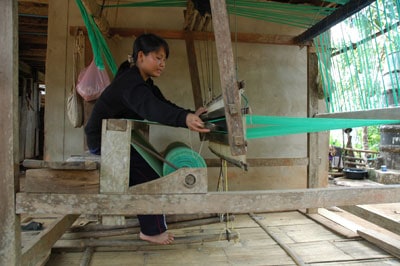
As the evening approaches, Marisa spends one or two hours preparing the family supper, which is eaten at six every night. After dinner, at around nine o’clock Marisa carries her healthy baby girl to bed, where they both fall asleep after a long day full of activity and work.
“My children love to go to the church and are filled with excitement each time they go. They wake up very early to get ready to walk to their favorite place. They love to play with the colorful toys provided, eat snacks, and have fun playing games with their friends. The staff members are very kind and loving to all the children.”
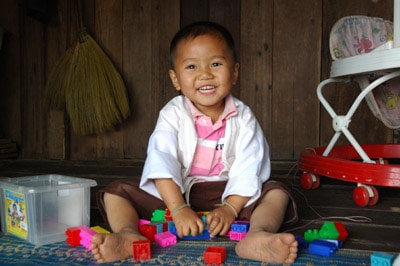
Marisa’s family may not have much money, but with the help of the Child Survival Program, this loving mother has learned how to establish a healthy and happy home for her children.

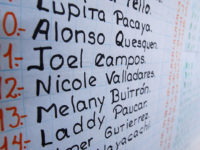

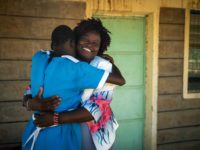
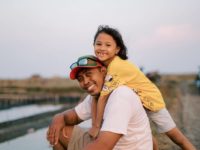


6 Comments |Add a comment
How do I become involved in the mission work? I am a 63 year old mother of 6 grandmother of 9 all saved and living for and loving Jesus. and have felt called to missions for quite a while but have not pursued it. I feel ready to get started now.
She has two very cute children! 🙂
Sara,
Education about the importance of breast feeding is part of the Child Survival Program. This blog post, Child Survival 101, has some more info about what the program involves.
I love to hear these success stories!! They all look so happy and healthy!
Do Compassion workers promote breastfeeding to these mothers? Does anyone know? I hope that they are trained in this area and realize how vital it is to these babies.
What a beautiful, encouraging story! I love the beautiful smile on Mayrisa’s sweet face! My hope and prayer is that somehow Marisa can be paid a better rate for her weaving!